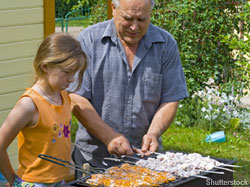
(ARA) – Summer is here and so is grilling season. Before firing up the grills, however, weekend warriors should observe a few simple precautions to ensure that backyard barbecue bashes don’t go up in flames.
Casual cookouts can turn dangerous – and sometimes deadly – if safety is ignored, according to leading home insurer MetLife Auto & Home. “Every year, we see dozens of fire-related claims reported throughout the summer because of simple carelessness,” says Mike Convery, vice president and chief claim officer at MetLife Auto & Home. “Keeping safety basics top-of-mind can help prevent losses from occurring and help you avoid needless hassle and property damage – and in some situations, injury to you or your loved ones.”
Follow these easy pointers to make grilling safer:
* Keep barbecue grills on a level surface away from the house, garage and, most importantly, children and pets. When grilling on your patio, make sure that all furniture and accessories are far from the grill. On balconies, it is always safer to move festivities to available lawn space. Never grill inside the home or garage, even if it is raining.
* For gas grills, always store gas cylinders outside and away from your house, and be sure the valves are turned off when not in use. Check the tubes regularly for cracking, brittleness, and leaks in the connections. To determine if there is a leak, simply pour soapy water over the line with the gas valve turned open. If gas is escaping, bubbles will appear. Should you detect a leak, immediately turn off the gas and don’t use the grill until the leak is repaired.
* Your grill generates high temperatures, so keep it covered whenever possible. Keep lighted cigarettes, matches and open flames away from the grill, and move gas hoses as far away as possible from hot surfaces and grease. Use a can to catch excess grease.
* Make certain your grill is kept at least 2 to 3 feet away from wood or vinyl siding. Placing the grill too close to your home, especially one with vinyl siding, can result in melting or burning, or even a fire. Also, keep in mind that while vinyl siding and composite decking have a higher “burn point” than wood, it’s also easier for these materials to melt and discolor, which can result in a costly claim for property damage.
* For charcoal grills, use only starter fluids designed for your grill and never use gasoline. Limit the amount of fluid used. If the fire is too low, use dry kindling and add more charcoal, if necessary. To avoid a flash fire – a fire that spreads rapidly through the vapors of an ignitable liquid – never add more liquid fuel to a lighted grill.
* When using bamboo or wood skewers, soak them in cool water prior to use so they won’t ignite on the grill.
* Keep a fire extinguisher accessible and never leave a grill unattended once it has been lit. If an extinguisher isn’t available, consider keeping a bucket of sand or a garden hose nearby.
* Never allow burned coals to smolder in any container on a wooden deck and make sure to soak your coals before disposing of them by wrapping them in heavy-duty aluminum foil and putting them in a non-combustible container away from the house.
“These precautions should be used for all outdoor cooking devices, including propane turkey fryers and outdoor fire pits,” Convery says.”Above all, remember that whatever you’re cooking with outdoors will remain hot for hours and that wooden surfaces, such as decks, can present fire hazards, so never place cooking devices directly upon them. We have received serious home insurance fire damage claims, some involving loss of life, that started because cooks forgot that the party isn’t over until the last flame has been extinguished.”
For a comprehensive look at fire safety protection, MetLife Auto & Home offers a free brochure on “Fire Safety,” featuring useful information about fire-related subjects, including how to plan an escape route, seasonal safety tips and safety information related to heating your home. A coloring and activity book is also available for children, titled “Learn About Fire Safety with the PEANUTS Gang,” that helps children learn critical emergency information, the steps to fire safety and how to develop escape routes to use in the event of a fire. The brochure and coloring book are available free from (800) 608-0190.
Courtesy of ARAcontent





